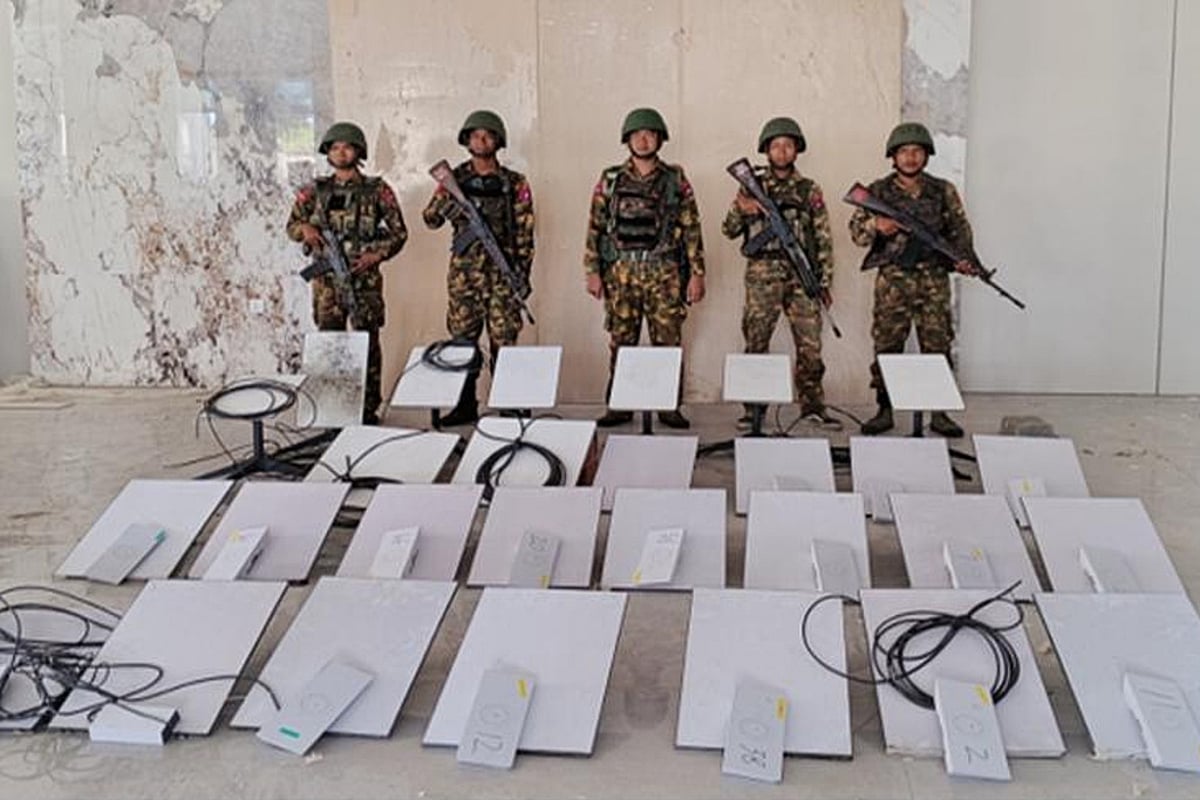Myanmar Military Dismantles Major Cybercrime Operation
Myanmar’s military has recently dismantled a significant online scam operation near the Thai border, leading to the detention of over 2,000 individuals and the confiscation of numerous Starlink satellite internet terminals. This crackdown highlights the ongoing issue of cybercrime in the region, where scams have become a notorious problem affecting victims worldwide.
Details of the Operation
According to reports from state media, the military’s actions were part of a broader initiative aimed at combating online fraud, illegal gambling, and cross-border cybercrime. The raid took place at KK Park, a known cybercrime hub located on the outskirts of Myawaddy, a key trading town in Kayin state. The operation began in early September and has drawn attention due to the scale of the arrests and the equipment seized.
The military’s spokesperson, Maj. Gen. Zaw Min Tun, accused leaders of the Karen National Union, an armed ethnic group, of being involved in the scam activities at KK Park. This claim has been met with denial from the Karen group, which is part of the larger resistance movement against the military government. They argue that the allegations stem from previous assertions that a company associated with them had leased the land for the operation.
The Nature of Cybercrime in Myanmar
Myanmar has gained a reputation for hosting various cybercrime operations, often involving scams that exploit victims through romantic schemes or fraudulent investment opportunities. These operations frequently recruit individuals from other countries under false pretenses, promising legitimate employment while forcing them into criminal activities.
The recent crackdown follows heightened international scrutiny of cybercrime syndicates in Southeast Asia. Just last week, the United States and Britain imposed sanctions on individuals linked to a major Cambodian cybercrime gang, further emphasizing the global nature of these illicit activities.
Seizures and Detentions
During the raid, the military reported the seizure of 30 Starlink satellite terminals, which are part of Elon Musk’s SpaceX initiative. Although Starlink does not have licensed operations in Myanmar, many terminals have reportedly been smuggled into the country. The military’s report indicated that 2,198 people were detained, although their nationalities were not disclosed.
The crackdown is part of ongoing efforts by Myanmar, Thailand, and China to address human trafficking and cybercrime. Earlier this year, these nations collaborated to rescue thousands of individuals from scam operations, working alongside ethnic armed groups that control border areas.
International Response
The international community has increasingly focused on the issue of cybercrime emanating from Southeast Asia. The recent sanctions by the U.S. and U.K. against cybercriminals highlight a growing recognition of the need for coordinated action to combat these networks. As these operations continue to evolve, the pressure on regional governments to take decisive action is likely to increase.
FAQs
What prompted the military’s crackdown on cybercrime in Myanmar?
The military’s crackdown was part of a broader initiative to combat online fraud, illegal gambling, and cross-border cybercrime, particularly in response to the growing notoriety of Myanmar as a hub for such activities.
How many people were detained during the raid at KK Park?
During the operation at KK Park, the military detained 2,198 individuals, although their nationalities were not specified in the reports.
What is the significance of the seized Starlink terminals?
The seized Starlink terminals are significant as they indicate the use of advanced technology in cybercrime operations. Starlink, a satellite internet service, is not licensed in Myanmar, yet many terminals have been smuggled into the country, facilitating these illicit activities.
Conclusion
The recent military operation in Myanmar underscores the ongoing battle against cybercrime in the region. With thousands detained and significant equipment seized, the military aims to disrupt these criminal networks. As international scrutiny grows, continued efforts will be necessary to address the complexities of cybercrime and human trafficking in Southeast Asia.
The presence of cybercrime operations in Myanmar has been exacerbated by the political instability following the military coup in February 2021. This turmoil has created an environment where criminal enterprises can thrive, often taking advantage of vulnerable populations. Many individuals involved in these scams are reportedly lured with promises of employment, only to find themselves trapped in exploitative situations.
The military’s recent actions may also reflect a strategic shift in its approach to governance and public perception. By targeting cybercrime, the military aims to project an image of authority and control, potentially seeking to regain legitimacy both domestically and internationally. However, the effectiveness of such operations in curbing the broader issue of organized crime remains to be seen, as the underlying factors contributing to these activities persist.
As regional cooperation continues to evolve, it will be crucial for Myanmar and its neighbors to develop comprehensive strategies that address not only the symptoms of cybercrime but also the root causes, including poverty and lack of opportunity. The collaboration between governments and civil society organizations will be essential in creating sustainable solutions to combat these complex challenges.
Also Read:
Sharjah Investment Forum 2025 Kicks Off with Global Leaders
Nuclear Workers Furloughed as Government Shutdown Continues
US Military Strikes Drug-Courier Vessel in International Wat







